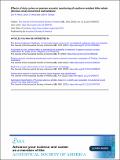Effects of duty cycles on passive acoustic monitoring of southern resident killer whale (Orcinus orca) occurrence and behavior
Date
31/03/2022Metadata
Show full item recordAbstract
Long-term passive acoustic monitoring of cetaceans is frequently limited by the data storage capacity and battery life of the recording system. Duty cycles are a mechanism for subsampling during the recording process that facilitates long-term passive acoustic studies. While duty cycles are often used, there has been little investigation on the impact that this approach has on the ability to answer questions about a species' behavior and occurrence. In this study, the effects of duty cycling on the acoustic detection of southern resident killer whales (SRKW) (Orcinus orca) were investigated. Continuous acoustic data were subsampled to create 288 subsampled datasets with cycle lengths from 5 to 180 min and listening proportions from 1% to 67%. Duty cycles had little effect on the detection of the daily presence of SRKW, especially when using cycle lengths of less than an hour. However, cycle lengths of 15–30 min and listening proportions of at least 33% were required to accurately calculate durations of acoustic bouts and identify those bouts to ecotype. These results show that the optimal duty cycle depends on the scale of the research question and provide a framework for quantitative analysis of duty cycles for other marine species.
Citation
Rand , Z R , Wood , J D & Oswald , J N 2022 , ' Effects of duty cycles on passive acoustic monitoring of southern resident killer whale ( Orcinus orca ) occurrence and behavior ' , Journal of the Acoustical Society of America , vol. 151 , no. 3 , pp. 1651-1660 . https://doi.org/10.1121/10.0009752
Publication
Journal of the Acoustical Society of America
Status
Peer reviewed
ISSN
0001-4966Type
Journal article
Description
Funding from the ECHO Program of the Vancouver Fraser Port Authority.Collections
Items in the St Andrews Research Repository are protected by copyright, with all rights reserved, unless otherwise indicated.

